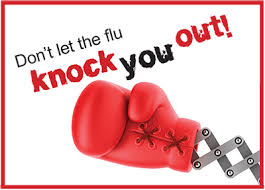 MYTHS ABOUT FLU AND FLU VACCINE
MYTHS ABOUT FLU AND FLU VACCINE Don't let these myths fool you into skipping the flu vaccine:
MYTH: The flu shot gives you the flu.
No, it can't. The influenza viruses in the shot are inactive and not infectious.
MYTH: It’s better to get the flu than the flu vaccine. No, having the flu is worse. Flu is a potentially dangerous infection. It can make you very sick and cause you to miss work, school and other activities. For high-risk groups such as children, seniors, and people with chronic health conditions like heart disease or diabetes, the flu can lead to severe complications such as bronchitis or pneumonia, resulting in hospitalization and even death.
Most people get the flu shot without any problems. Minor side effects can be get soreness, redness or swelling where the shot was given; fever (low grade); and aches. Serious reactions to the flu shot are rare.
MYTH: You don’t need to get the flu shot if you got one last year. No, you need flu vaccine every year. You need to get it every year because vaccine protection wanes over time. Also, even if any of the viruses in this season’s vaccines are the same as last year’s, you can still get sick this season, because the immunity you developed from last year’s vaccine may have declined since then.
PROTECT YOUR HEALTH DURING FLU SEASON AND ALL YEAR LONG: WASH YOUR HANDS!
In addition to getting flu vaccine, there's a step you can take to reduce your chances of getting and spreading the flu: handwashing! In fact, washing your hands often is a good way to protect your health
all year long, not just during flu season. Many everyday objects and surfaces we touch have lots of germs on them, and if you touch your eyes, nose or mouth after touching them, you can expose yourself to all sorts of germs.
When you wash your hands, use plenty of soap and warm water and wash for at least 20 seconds (about the time it takes to sing "Happy Birthday" twice).